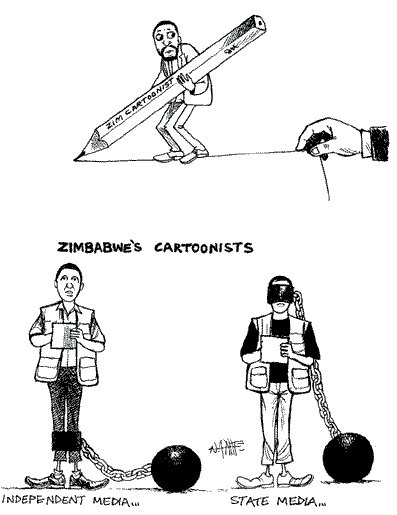Africacartoons: entrevista com o fundador
Published1 Apr 2015

Imagem: Tony Namate (Zimbabué)
Africacartoons é um site que reúne desenhos satíricos políticos de criadores africanos. O seu fundador, Tejumola Olaniyan, fala sobre o projecto em entrevista ao site African Digital Art
Your site features an interactive map that displays a large collection of political cartoonists of over 180 cartoonists. How did you go about amassing this collection?
I developed an interest in clipping and collecting political cartoons from the newspapers during my secondary school years in Nigeria in the 1970s. Often, I bought the papers because of the cartoons. I was not consistent with the collecting, but what that interest did was to teach me to value the cartoon as an art that could educate and entertain well beyond its topical theme publication date. Two decades later when I became a scholar of literature, I naturally gravitated toward popular culture as an area of related interest. I wrote on popular music, then my dormant interest in cartoons resurfaced forcefully. I was already in the US then. From my university library and through interlibrary loans, I borrowed boxes and boxes of microfiche films of early and old African newspapers, went through them page by page and printed out the cartoon pages. It was a laborious process, and research assistants ably assisted along the way. Collecting is much easier now, thanks to the internet. But carefully preparing the images for web upload is still labor intensive and again, I have very able research assistants.
What do you think is the importance of political cartoons in Africa, Why are they important? Why do you think it is important to have a digital archive? Do you think political cartooning has had any influence on African visual culture and arts? How?
Politics is the art of managing the way we organize ourselves in society, how we marshal and distribute resources and responsibilities. Politics, as such, will never cease to be a contentious business, and political cartoons are everyday in-the-moment commentaries on how we could still do better, all things considered. In this sense, the political cartoon is a most utopian art in the most heroic and selfless way. It never praises us, because it believes we can always do better, and it pokes fun at us for not aiming higher. It does all the goading in the most hilariously entertaining way. The particular targets of a political cartoon may not always see the humour or irony, but the political cartoon is a foundationally humanist art, so its attacks are never as absolute enemies who must destroy one another but as fellow human beings sharing the same space, in competition, a competition between the rich and the poor, the powerful and the powerless, a competition we must continually struggle to manage better. This is the big significance of political cartoons. The world would be much poorer indeed without them.
A entrevista completa aqui
Galeria de imagens no The Guardian
